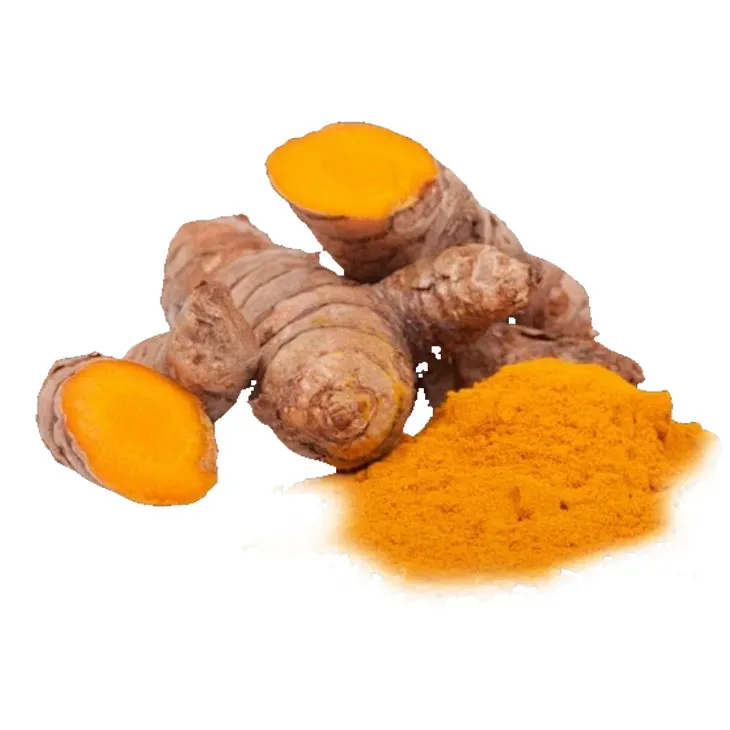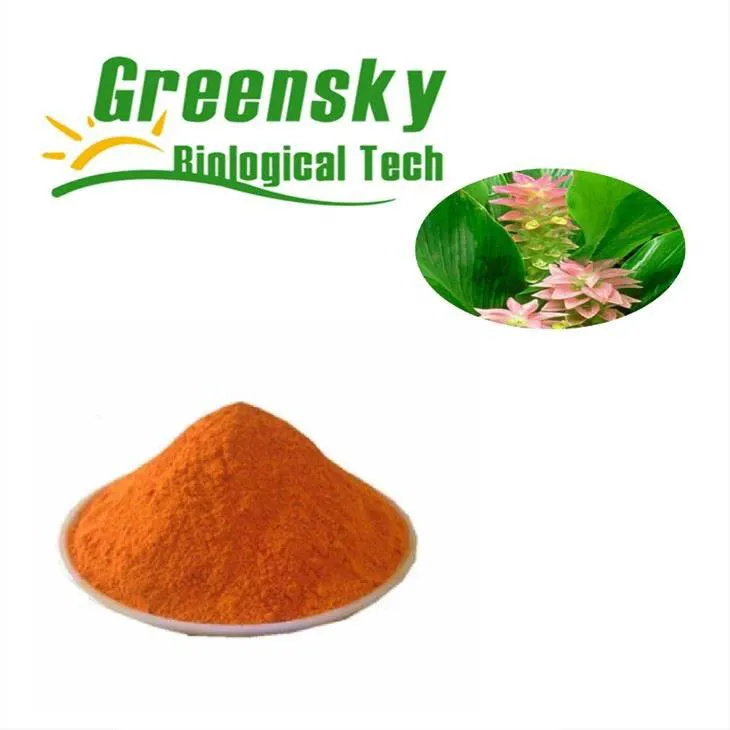- 0086-571-85302990
- sales@greenskybio.com
Organic non - transgenic curcumin.
2024-11-28

Introduction to Organic Non - GMO Curcumin
Organic non - GMO Curcumin has been gaining significant attention in the realm of natural health. Curcumin, a natural compound, is derived from the turmeric plant. When it is both organic and non - genetically modified, it adheres to the highest standards of purity and naturalness. Organic certification ensures that the turmeric from which curcumin is sourced is grown without the use of synthetic pesticides, fertilizers, or other artificial chemicals. The non - GMO aspect guarantees that it has not been genetically engineered, which is appealing to those who prefer natural and unadulterated dietary supplements.

Health - Promoting Properties
Anti - Inflammatory Properties
One of the most remarkable aspects of curcumin is its anti - inflammatory nature. Inflammation is a natural response of the body to injury or infection, but chronic inflammation can lead to a host of health problems. Many medications used to treat inflammation often come with side effects. However, curcumin offers a natural alternative for those seeking relief from chronic inflammatory conditions. It works by modulating various inflammatory pathways in the body. For example, it can inhibit the production of certain inflammatory cytokines, which are signaling molecules that play a crucial role in the inflammatory process.
Antioxidant Activity
Antioxidant activity is another important property of organic non - GMO curcumin. Oxidative stress occurs when there is an imbalance between the production of free radicals and the body's ability to detoxify them or repair the resulting damage. Free radicals are highly reactive molecules that can damage cells, proteins, and DNA. Curcumin acts as an antioxidant by donating electrons to free radicals, thereby neutralizing them. This helps in protecting the body's cells from oxidative damage and is associated with a reduced risk of various chronic diseases, such as heart disease, cancer, and neurodegenerative disorders.
Brain Health Benefits
There are emerging studies that suggest curcumin may have a positive impact on brain health. In terms of cognitive function, curcumin may help improve memory, attention, and overall cognitive performance. It has been shown to cross the blood - brain barrier, which is a crucial step in exerting its effects on the brain. Additionally, curcumin may play a role in mood regulation. Some research indicates that it may have antidepressant - like effects, potentially through its influence on neurotransmitter levels in the brain, such as serotonin.

Benefits in Chronic Disease Management
Heart Disease
In the context of heart disease, the anti - inflammatory and antioxidant properties of curcumin come into play. Chronic inflammation in the blood vessels is a key factor in the development of atherosclerosis, which can lead to heart attacks and strokes. By reducing inflammation and oxidative stress, curcumin may help in preventing the buildup of plaque in the arteries. It may also have a positive effect on blood lipid levels, such as reducing LDL (bad) cholesterol and increasing HDL (good) cholesterol.
Cancer
While curcumin is not a substitute for conventional cancer treatments, it may have a role in cancer prevention and as an adjunct to treatment. Its antioxidant activity can help protect cells from DNA damage that may lead to cancer. Additionally, curcumin has been shown to have anti - proliferative effects on cancer cells in vitro, meaning it can inhibit their growth and division. Some studies also suggest that it may enhance the efficacy of chemotherapy and radiotherapy while reducing their side effects.
Arthritis
For those suffering from arthritis, which is characterized by joint inflammation, curcumin can be a valuable supplement. It can help reduce pain, swelling, and stiffness in the joints. The anti - inflammatory mechanisms of curcumin are particularly relevant in this context, as it can target the inflammatory mediators in the joints. This can potentially improve the quality of life for arthritis patients without the need for excessive use of non - steroidal anti - inflammatory drugs (NSAIDs), which can have adverse effects on the stomach and kidneys.

How to Incorporate Organic Non - GMO Curcumin into Your Diet
There are several ways to include organic non - GMO curcumin in your diet. One of the simplest ways is through the use of turmeric powder, which contains curcumin. You can add turmeric powder to your cooking, such as in curries, stir - fries, and soups. However, it's important to note that the curcumin content in turmeric powder is relatively low, so you may need to use a significant amount to obtain a therapeutic dose.
Another option is to take curcumin supplements. These are available in various forms, including capsules and tablets. When choosing a curcumin supplement, it's crucial to look for products that are labeled as organic and non - GMO. Additionally, some supplements may be formulated with other ingredients to enhance the absorption of curcumin, as curcumin has relatively low bioavailability on its own. For example, some products may contain Black Pepper Extract (piperine), which has been shown to increase curcumin absorption.

Precautions and Considerations
While organic non - GMO curcumin is generally considered safe for most people, there are some precautions to keep in mind. Curcumin may interact with certain medications, such as blood thinners. If you are taking any medications, it's important to consult your healthcare provider before starting curcumin supplementation.
Some people may experience mild side effects, such as gastrointestinal discomfort, when taking curcumin. This can often be alleviated by starting with a low dose and gradually increasing it. Pregnant and breastfeeding women should also exercise caution, as there is limited research on the safety of curcumin during pregnancy and lactation.

Conclusion
Organic non - GMO curcumin represents a natural and potent option for those looking to improve their health holistically. Its multiple health - promoting properties, including anti - inflammatory, antioxidant, and potential benefits for brain health and chronic disease management, make it a valuable addition to a healthy lifestyle. Whether incorporated through diet or supplementation, curcumin offers a natural alternative to support overall well - being. However, it's important to be aware of the precautions and considerations to ensure safe and effective use.
FAQ:
What is organic non - GMO curcumin?
Organic non - GMO curcumin is a natural compound. It is not produced through genetic engineering and adheres to organic principles. It has many health - promoting properties, such as anti - inflammatory and antioxidant effects.
What are the health benefits of organic non - GMO curcumin?
It has anti - inflammatory properties, which can be an alternative for those with chronic inflammatory conditions without the side effects of some medications. It also has antioxidant activity, helping the body defend against oxidative stress. Moreover, emerging studies suggest it may have a positive impact on brain health like cognitive function and mood regulation.
How does organic non - GMO curcumin help with inflammation?
It has a natural anti - inflammatory nature. While the exact mechanisms are still being studied, it can potentially reduce inflammation in the body. This makes it a good option for people who want to manage inflammation without relying on some drugs that may have unwanted side effects.
Is organic non - GMO curcumin safe to use?
Generally, it is considered safe for most people. However, as with any supplement, it's advisable to consult a healthcare professional before starting to use it, especially if you have pre - existing medical conditions or are taking other medications.
How can one incorporate organic non - GMO curcumin into their diet?
It can be taken as a supplement in the form of capsules. Also, curcumin is a component of turmeric, so using turmeric in cooking is another way to get it into your diet. For example, adding turmeric to curries, smoothies or even making turmeric tea.
Related literature
- The Role of Curcumin in Health and Disease"
- "Organic and Non - GMO Compounds in Nutritional Health"
- "Curcumin: A Natural Anti - Inflammatory and Antioxidant Agent"
- ▶ Hesperidin
- ▶ citrus bioflavonoids
- ▶ plant extract
- ▶ lycopene
- ▶ Diosmin
- ▶ Grape seed extract
- ▶ Sea buckthorn Juice Powder
- ▶ Beetroot powder
- ▶ Hops Extract
- ▶ Artichoke Extract
- ▶ Reishi mushroom extract
- ▶ Astaxanthin
- ▶ Green Tea Extract
- ▶ Curcumin Extract
- ▶ Horse Chestnut Extract
- ▶ Other Problems
- ▶ Boswellia Serrata Extract
- ▶ Resveratrol Extract
- ▶ Marigold Extract
- ▶ Grape Leaf Extract
- ▶ blog3
- ▶ blog4
-
High - quality Chasteberry Extract Products.
2024-11-28
-
China's banana juice powder suppliers.
2024-11-28
-
Bulk purchase of cranberry extract.
2024-11-28
-
How to make powder with bayberry extract?
2024-11-28
-
The best peony root extract in nature.
2024-11-28
-
100% Pure Organic Baicalin.
2024-11-28
-
Beetroot juice Powder
2024-11-28
-
Grape Seed Extract
2024-11-28
-
Nettle Root Extract
2024-11-28
-
Lotus leaf extract
2024-11-28
-
Baicalin
2024-11-28
-
Resveratrol extract
2024-11-28
-
Cassia Seed Extract
2024-11-28
-
Tamarind extract powder
2024-11-28
-
Nutmeg Extract
2024-11-28
-
Coconut Water Powder
2024-11-28





















